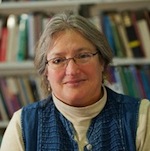
Dona Brown, Professor of History
For many of us today, the phrase “going back to the land” may bring to mind a vision of the 1960s: yurts and domes, communes and co-ops. But Americans have been dreaming of returning to the land for over a hundred years, and earlier back-to-the-landers were often motivated by dramatically different beliefs, hopes, and fears. What sorts of people dreamed of “returning to the land” in 1900, and why? Who left the city, and who helped other people to leave? Professor Brown discusses the cultural politics of the first back-to-the-land movement and considers the legacy it bequeathed to movements in the 1930s, 1970s, and beyond.
Video (MP4) LARGE FILE!
Audio (MP3)
Dona Brown has been on the faculty in the History Department at the University of Vermont since 1994. Her first book, Inventing New England: Regional Tourism in the Nineteenth Century (Smithsonian Press, 1995), explored the significance of the tourist trade in shaping New England’s regional identity. She has published widely on both tourism and American regionalism, and she was director of the Center for Research on Vermont from 2003 to 2006. Her new book, Back to the Land: The Enduring Dream of Self-Sufficiency in Modern America (University of Wisconsin Press, 2011), explores the long history of back-to-the-land movements in the United States.
The College of Arts and Sciences Full Professor Lecture Series was designed to give newly promoted faculty an opportunity to share with the university community a single piece of research or overview of research trajectory meant to capture the spark of intellectual excitement that has resulted in their achieving full professor rank.

